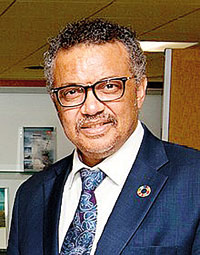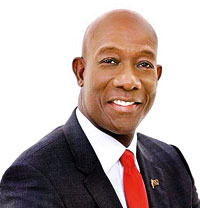Sunday Times 2
Why this is our best chance at defeating the pandemic
(CNN)- “Vulnerable” is how Ugandan midwife Harriet Nayiga feels, working for a grassroots organisation to provide sexual and reproductive health services in her community during the pandemic. “Stress” and “moral responsibility” accompanied first-year Pakistani nurse Sana Baloch on her rounds treating Covid-19 patients.

WHO chief Dr. Tedros Adhanom Ghebreyesus
And nurse Keisha Prevatt-Gomez, who became the first frontline health worker to be vaccinated in Trinidad and Tobago this week, described “anxiously waiting” for the pandemic to hit. She “worked feverishly” alongside her colleagues to minimise the risk of cross-contamination in medical facilities.
Frontline health workers around the world deserve our endless gratitude for their bravery and sacrifice during the pandemic.
But platitudes are not enough.
What Harriet, Sana, Keisha and other health heroes need more than anything is protection against the disease they fight every day.
And among the best protections available today is the one offered by vaccines.
A year into this pandemic, it is a miracle that more than 80 countries are rolling out vaccines. But most of those shots have been administered in a handful of rich countries. Meanwhile, health workers in 130 low- and middle-income countries are still waiting to receive the vaccine, according to the United Nations.
Vaccine equity has become Covid-19′s defining issue.
At the pandemic’s onset, drastic shortages of personal protective equipment endangered health workers worldwide. It was an outrage that these workers were on the front lines, saving lives at the risk of their own. Fast forward to 2021, many of those same health workers now lack the protection offered by vaccines.
To date, richer countries with bigger budgets have struck bilateral deals with vaccine manufacturers, securing hundreds of millions of doses before other countries have had a chance. This has sent a worrying message that the health of those in developed countries is worth more than those in other parts of the world.

Dr. Keith Rowley: Prime Minister of Trinidad and Tobago
But we will not defeat the pandemic if countries go it alone. There are compelling moral, scientific and economic reasons why.
And fortunately a solution exists: supporting equity.
Initiatives like the Access to COVID-19 Tools (ACT) Accelerator and its vaccine arm, COVAX, have created the only clear global paths for ensuring the world’s most vulnerable don’t miss out when vaccines, treatments and diagnostics are available.
The ACT-Accelerator — launched nearly a year ago by the World Health Organisation, the President of France, the President of the European Commission and the Bill & Melinda Gates Foundation — has played a key role in the research, development, manufacturing and distribution of diagnostic tests, analysed clinical trials for promising treatments and surveyed more than 100 countries to identify health system bottlenecks.
Meanwhile, COVAX is securing vaccine doses through advance purchase agreements with manufacturers, which will soon be administered in low- and middle-income countries.
COVAX, for example, will distribute about 100,000 to 120,000 doses of the vaccine to Trinidad and Tobago, which has also played a role in securing 260,000 more doses as part of a collective arrangement between the Caribbean Community and the African Medical Council.
COVAX has the support of 190 countries and territories including the Biden administration in the United States.
But this groundswell of solidarity must be backed by action and resources.
We are pleased to see G7 leaders making new commitments on Friday to rise to the most pressing Covid-19 vaccine equity needs for 2021. President Joe Biden, for example, announced a $2 billion donation to COVAX on Friday while Prime Minister Boris Johnson said the United Kingdom would donate surplus doses to other countries. This is a crucial step and significant boost to the success of the ACT-Accelerator; such support is essential for vaccinating health workers and vulnerable people in all countries.
But this is just the start.
Not enough doses exist to meet the global demand. Moreover, virus mutations pose new and continuing threats, while the need for more effective and affordable tests and treatments must still be met.
Pharmaceutical companies must ensure the affordability and accessibility of vaccines, knowing that this will safeguard the health of all people around the world and allow economic recovery to begin.
We also urge patent holders to share their know-how with initiatives like Covid-19 Technology Access Pool so more manufacturers can meet the global demand as quickly as possible.
But new tools alone will not bring the pandemic to an end.
Each and every one of us must keep practising proven public health measures, like mask wearing, physical distancing, ventilating and hand washing. Many countries, from New Zealand to Thailand, and Rwanda to El Salvador, have applied strategies to fight the coronavirus with impressive results, long before vaccines arrived on the scene. Going forward, we need even stronger surveillance efforts and genetic sequencing to stay ahead of new variants.
Covid has lifted the veil on a broad-based lack of investment and commitment in health. World leaders need to invest more in public health, implement systems to detect crises before they emerge and plan for future pandemics. Countries also need to make sure their health care systems are safe, equitable and affordable.
An international pandemic treaty — which could include provisions to finance and coordinate research, or establish a more efficient system of alerts — would also help the world respond to inevitable crises in the future.
We must keep championing science and strive to protect it from its foes, who have spread disinformation about the danger of the virus and called into question vaccines, masks and other public health measures that are proven to be effective.
Combined, this has caused needless suffering and stymied response and recovery efforts globally.
One year into this pandemic, we know a lot more about the virus, from its ability to spread to the threat posed by mutations. We know how to diagnose it, treat it and, now, vaccinate people against it.
It is only by doing these things more equitably and efficiently that we can leave the pain of Covid-19 behind, protect heroes like Harriet, Sana and Keisha, and help the world set out on the road to recovery.
(Dr. Keith Rowley is the Prime Minister of the Republic of Trinidad and Tobago. Dr. Tedros Adhanom Ghebreyesus is the Director-General of the World Health Organization.)


